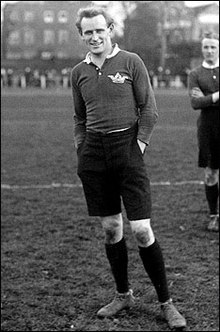 Poulton in 1911 | |||||||||||||||||||||||||||||||||||||
| Birth name | Ronald William Poulton | ||||||||||||||||||||||||||||||||||||
|---|---|---|---|---|---|---|---|---|---|---|---|---|---|---|---|---|---|---|---|---|---|---|---|---|---|---|---|---|---|---|---|---|---|---|---|---|---|
| Date of birth | 12 September 1889 | ||||||||||||||||||||||||||||||||||||
| Place of birth | Oxford, England | ||||||||||||||||||||||||||||||||||||
| Date of death | 4 May 1915 (aged 25) | ||||||||||||||||||||||||||||||||||||
| Place of death | Ploegsteert Wood, Belgium | ||||||||||||||||||||||||||||||||||||
| Cause of death | Killed in action | ||||||||||||||||||||||||||||||||||||
| Height | 5 ft 11 in (180 cm)[1] | ||||||||||||||||||||||||||||||||||||
| School | |||||||||||||||||||||||||||||||||||||
| University | Balliol College, Oxford | ||||||||||||||||||||||||||||||||||||
| Notable relative(s) |
| ||||||||||||||||||||||||||||||||||||
| Rugby union career | |||||||||||||||||||||||||||||||||||||
| |||||||||||||||||||||||||||||||||||||
| ---- | |||||||||||||||||||||||||||||||||||||
| Military career | |||||||||||||||||||||||||||||||||||||
| Buried | |||||||||||||||||||||||||||||||||||||
| Allegiance | |||||||||||||||||||||||||||||||||||||
| Service | |||||||||||||||||||||||||||||||||||||
| Years of service | 1912–1915 | ||||||||||||||||||||||||||||||||||||
| Rank | Lieutenant | ||||||||||||||||||||||||||||||||||||
| Unit | 1/4 Royal Berkshire Regiment | ||||||||||||||||||||||||||||||||||||
| Battles / wars | First World War | ||||||||||||||||||||||||||||||||||||
Ronald 'Ronnie' William Poulton (later sometimes Poulton-Palmer) (12 September 1889 – 5 May 1915) was an English rugby union footballer, who captained England. He was killed in the First World War during the Second Battle of Ypres.
Born in north Oxford, he was the son of Emily Palmer and her husband, the zoologist Sir Edward Bagnall Poulton. He was educated at the Dragon School, Rugby School, and Balliol College, Oxford.
Poulton played for Balliol College, Oxford University RFC, Harlequins and Liverpool F.C. Poulton is one of three men to score a hat-trick of tries in The Varsity Match – he scored five, still the individual record for the fixture, in 1909. He captained England during the 1913–14 unbeaten season (now what would be called a 'Grand Slam'), scoring four tries against France in 1914, in the last test match prior to the outbreak of World War I. Poulton was renowned for his elusiveness and glamorous style of play – "the very mention of swerving sends one's thoughts to the late Ronald Poulton, the swerver par excellence ... swerving and Poulton are almost synonymous terms".[2]
- ^ Poulton 1919, p. 3.
- ^ D. R. Gent in C. J. B. Marriott's Modern Rugby Football